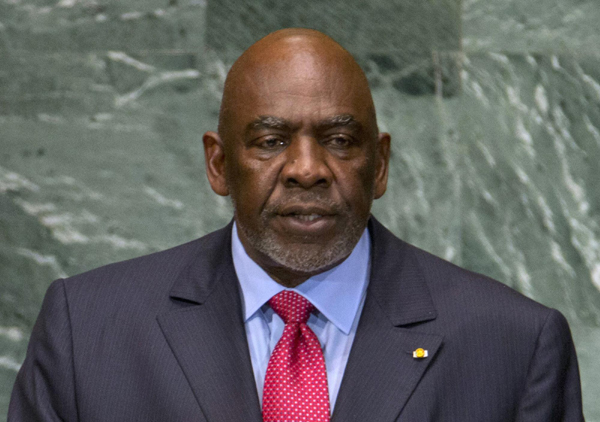Mali's PM steps down following arrest by junta
Updated: 2012-12-12 08:20
(Agencies/China Daily)
|
|||||||||||
Mali's prime minister resigned on state television early on Tuesday, hours after soldiers who led a recent coup burst into his home and arrested him, the latest sign of the volatile political situation in this once-stable West African nation.
Prime Minister Cheikh Modibo Diarra addressed the nation, saying: "Our country is living through a period of crisis. Men and women who are worried about the future of our nation are hoping for peace.
 |
|
Mali's Prime Minister Cheikh Modibo Diarra addresses the 67th session of the United Nations General Assembly at UN headquarters in New York, in this Sep 26, 2012 file photograph. [Photo/Agencies] |
"It's for this reason that I, Cheikh Modibo Diarra, am resigning along with my entire government on this day, Tuesday, Dec 11, 2012. I apologize before the entire population of Mali," he said.
Diarra appeared on TV at 4 am local time dressed in a dark suit, his forehead glistening with sweat, his expression somber.
Chinese Foreign Ministry spokesman Hong Lei said on Tuesday that China noticed reports of Diarra's resignation and dissolution of the cabinet early in the day.
"China hopes all parties in Mali can retain solidarity and achieve a smooth political transition," Hong said.
A police officer and an intelligence official, who spoke on condition of anonymity because they were not authorized to speak to the media, confirmed that the Diarra had been arrested at his residence at around 10 pm on Monday by soldiers loyal to Captain Amadou Haya Sanogo, the leader of the coup on March 21.
Diarra was preparing to leave for Paris and the plane that was to take him was already taxiing at the airport. It's unclear if the trip to France was planned, or if Diarra had gotten wind of his pending arrest and was trying to flee.
The security officials said the prime minister was forced into a car and driven to the Kati military camp, the sprawling military base where the March 21 coup was launched under the orders of Sanogo. For several weeks, tension has been mounting between the officers who led the coup and Diarra, the civilian prime minister they were forced to appoint when they handed power back to a transitional government.
The police officer, who was on duty on Monday night at Bamako's international airport preparing for Diarra's departure for Paris, said a group linked to the junta stormed the airport. "The plane that was to take the prime minister to France was on the point of departure," said the officer. "It was stopped by people from the group Yerewoloton who invaded the airport. Those people are still at the airport as we speak, searching cars."
Bakary Mariko, a spokesman for Sanogo, said Diarra's resignation is not a coup and a new premier will be named soon.
Mariko told France 24 television that Diarra was "not a man of duty" and added that a successor will "be named in the coming hours by the president".
The resignation brought further chaos to a country already effectively split in two after armed Islamists linked to al-Qaida and Tuareg rebels took control of the vast desert north.
Yerewoloton, a violent citizen's movement, is believed to be backed by the junta. On May 21, they broke through the security cordon at the presidential palace and beat up the newly appointed interim president, 70-year-old Dioncounda Traore. The beating brought immediate international condemnation and afterwards coup leader Sanogo was forced to retreat from public life.
He has kept a low profile in recent months, emerging only occasionally to criticize a military plan by Mali's neighbors, who want to send 3,300 troops to take back Mali's north from armed Islamist groups.
Diarra, an astrophysicist who led one of NASA's Mars exploration programs, was initially seen as in step with Sanogo. Critics lambasted him for frequently driving to the Kati barracks to see the coup leader, apparently to seek his advice long after Sanogo was supposed to have handed power to civilians. In recent weeks though, Diarra has appeared to be taking stances that sometimes conflict with Sanogo.
Last weekend, for example, Diarra helped organize a demonstration calling for a United Nations-backed military intervention to take back Mali's north, which fell to Islamic extremists in the chaos following the coup.
On Monday at the UN, France circulated a UN Security Council resolution that would authorize the deployment of an African-led force to oust al-Qaida-linked militants who seized Mali's northern half. The United States, however, wants the troops to be trained first for desert warfare, UN diplomats said.
Experts on Mali have voiced skepticism over the military intervention, specifically because the plan initially put forward by the African Union gives a central role to the Malian military, which is still in the hands of Sanogo. African diplomats who were involved in the negotiations with Sanogo that led to the creation of Diarra's transitional government say the coup leader does not want foreign forces on Malian soil because it would dilute his power.
AP-AFP-China Daily
Related Stories
AU approves plan to recapture North Mali 2012-11-14 10:23
West African bloc to deploy 3,300 troops in Mali 2012-11-12 13:26
Head of AU standby force arrives in Mali 2012-11-05 16:06
Mali's DM: War inevitable to resolve north crisis 2012-10-31 17:03
Mali plans to develop new tourism products 2012-10-24 18:28
Today's Top News
President Xi confident in recovery from quake
H7N9 update: 104 cases, 21 deaths
Telecom workers restore links
Coal mine blast kills 18 in Jilin
Intl scholarship puts China on the map
More bird flu patients discharged
Gold loses sheen, but still a safe bet
US 'turns blind eye to human rights'
Hot Topics
Lunar probe , China growth forecasts, Emission rules get tougher, China seen through 'colored lens', International board,
Editor's Picks

|

|

|

|

|

|





